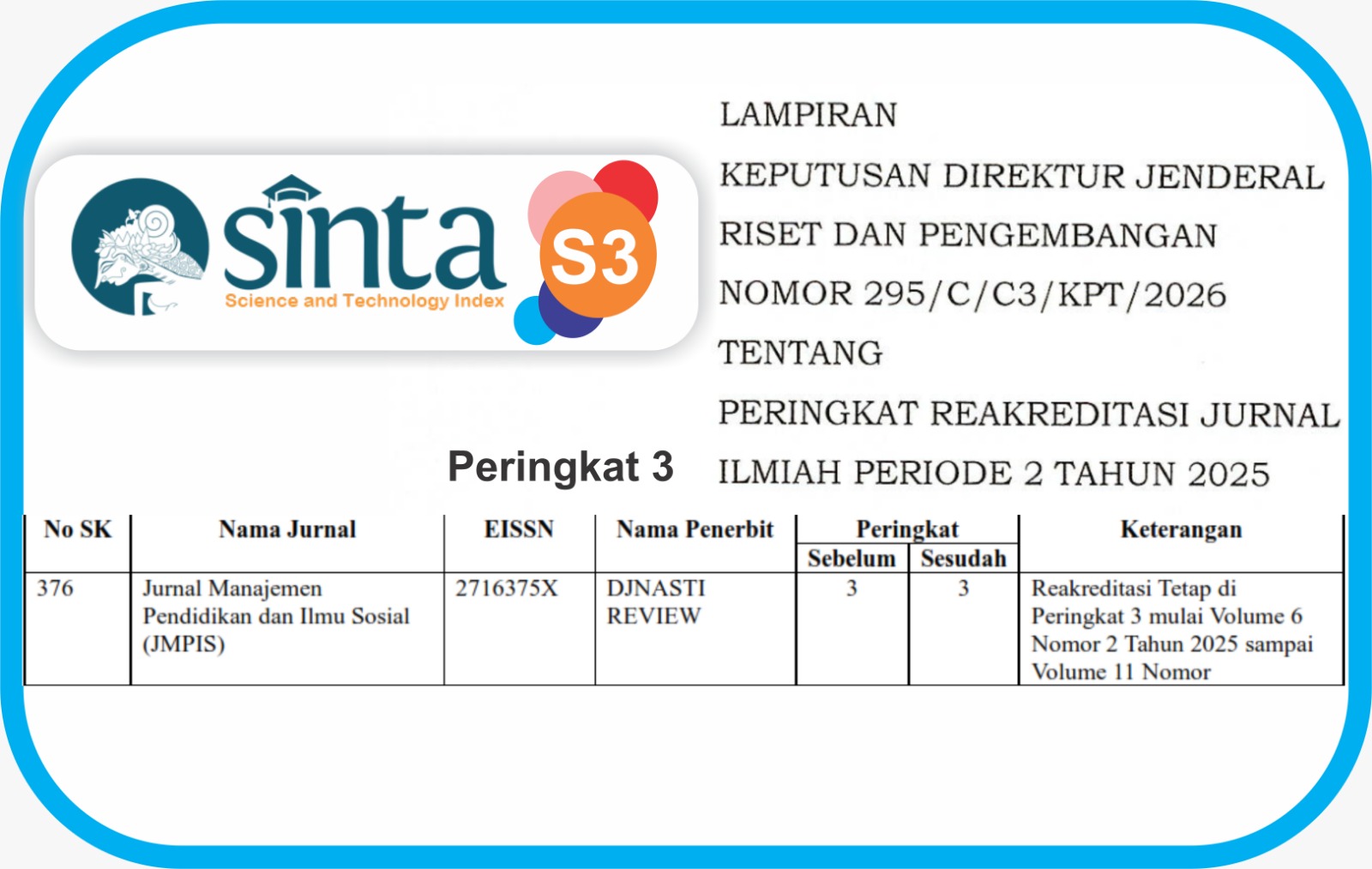Pengembangan Motivasi Karyawan Yang Membuat Perilaku Karyawan Selalu Meningkatkan Kinerjanya Melalui Teori Perilaku Azjen
DOI:
https://doi.org/10.38035/jmpis.v5i3.1948Keywords:
Pengembangan motivasi karyawan, peningkatan kinerja karyawan, teori perilaku AzjenAbstract
Adanya perbedaan pandangan dari teori azjen terhadap motivasi karyawan perihal proses penyelesaian pekerjaan melalui sikap dan perilaku yang ada pada diri karyawan ketika pekerjaan itu diberikan dan ketika proses penyelesaian pekerjaan, dimana proses perilaku karyawan dapat dilihat apakah karyawan tersebut memiliki motivasi berebih atau tidak Tujuan penelitian ini adalah untuk mengetahui dan menganalisis teori perilaku Azjen dalam menyikapi perilaku peningkatan motivasi karyawan dalam menyelesaikan pekerjaan, serta hubungan antara motivasi karyawan dalam penyelesaian pekerjaan dengan baik dan benar terhadap teori perilaku Azjen. Metode penelitian yang dilakukan adalah kualitatif dengan menggunakan metode studi kepustakaan, dimana teknik pengumpulan data pada penelitian ini dilakukan dengan menggunakan observasi dan studi dokumentasi, sedangkan analisa data yang dilakukan dengan menggunakan systematic literature review. Hasil penelitian menjelaskan bahwa peran dan hubungan antara motivasi karyawan dalam penyelesaian pekerjaan dengan baik dan benar terhadap Teori Perilaku Azjen, yaitu peran teori Azjen dalam menjelaskan motivasi karyawan, hubungan antara motivasi karyawan dan niat untuk melaksanakan pekerjaan, strategi impelemtasi untuk meningkatkan motivasi dan pengukuran dan evaluasi kinerja karyawan. Selain itu,dari hasil penelitian disimpulkan bahwa terdapat hubungan antara motivasi karyawan dan teori perilaku Azjen yang dapat diketahui dari beberapa cara yang berkaitan antara teori Azjen dan motivasi karyawan dalam menyelesaikan pekerjaan dnegan benar dna baik, yaitu niat untuk berkinerja tinggi, sikap terhadap kinerja tinggi, norma subjektif yang mendukung, serta persepsi kontrol perilaku diri.
References
Afsar, Bilal, et al. (2020). Responsible leadership and employee’s proenvironmental behavior: The role of organizational commitment, green shared vision, and internal environmental locus of control. Journal Corporate Social Responsibility and Environmental Management, 1–16. https://doi.org/10.1002/csr.1806
Ahmed Chemseddine, B., & Kamel, M. (2021). Using the Theory of Planned Behavior to Explore Employees Intentions to Implement Green Practices. Dirassat Journal Economic Issue, 12(1), 641–659. https://doi.org/10.34118/djei.v12i1.1118
Aigbefo, Queen A., Blount, Yvette and Marrone, M. (2022). The influence of hardiness and habit on security behaviour intention. Journal Behaviour and Information Technology, 1–20. https://doi.org/10.1080/0144929X.2020.1856928
Al-Ghazali, B. M., & Afsar, B. (2020). Green human resource management and employees’ green creativity: The roles of green behavioral intention and individual green values. Corporate Social Responsibility and Environmental Management, 1–18. https://doi.org/10.1002/csr.1987
Aziz, Faiq, et al. (2021). Effects of emotions and ethics on pro-environmental behavior of university employees: A model based on the theory of planned behavior. Sustainability, 13(7062), 1–17. https://doi.org/10.3390/su13137062
Brito, Julia Souza, et al. (2022). Factors influencing waste sorting for Selective Collection in a Brazilian monetary institution. Journal Procedia Computer Science, 214, 1121–1127. https://doi.org/10.1016/j.procs.2022.11.286
Byrd, Jesse, et al. (2018). Explaining the job insecurity-safety link in the public transportation industry: The mediating role of safety-production conflict. Journal Safety Science, 106, 1–8. https://doi.org/10.1016/j.ssci.2016.11.017
Charfeddine, Lanouar and Umlai, M. (2023). ICT sector, digitization and environmental sustainability: A systematic review of the literature from 2000 to 2022. Journal Renewable and Sustainable Energy Reviews, 184, 113482. https://doi.org/10.1016/j.rser.2023.113482
Costantini, Arianna, et al. (2022). Implementing Job Crafting Behaviors: Exploring the Effects of a Job Crafting Intervention Based on the Theory of Planned Behavior. Journal of Applied Behavioral Science, 1–36. https://doi.org/10.1177/0021886320975913
Daniel, Ana Dias, Junqueira, Mégane and Rodrigues, J. C. (2022). The influence of a gamified application on soft mobility promotion: An intention perspective. Journal of Cleaner Production, 351, 131551. https://doi.org/10.1016/j.jclepro.2022.131551
Guhr, Nadine, Lebek, B., & and Breitner, M. H. (2018). The impact of leadership on employees’ intended information security behaviour: An examination of the full-range leadership theory. Journal Information Systems Journal, 29, 1–23. https://doi.org/10.1111/isj.12202
Hassan, Hemin Ali, et al. (2021). Public Service Motivation and Employee Change-Supportive Intention: Utilizing the Theory of Planned Behavior. Journal Public Personnel Management, 1–22. https://doi.org/10.1177/0091026020934515
Heslina, H., and Syahruni, A. (2021). The Influence of Information Technology, Human Resourcers Competency and Employee Engegement on Performance of Employees. Journal Human Resourcers Management, 1(1), 1–17.
Irizar-Arrieta, Ane, et al. (2020). User perspectives in the design of interactive everyday objects for sustainable behaviour. International Journal of Human Computer Studies, 137, 102393. https://doi.org/10.1016/j.ijhcs.2019.102393
Koay, Kian Yeik, et al. (2022). Understanding employees’ knowledge hiding behaviour: the moderating role of market culture. Behaviour and Information Technology, 41, 1–18. https://doi.org/10.1080/0144929X.2020.1831073
Lopes, José Rafael Nascimento, et al. (2019). A new model for assessing industrial worker behavior regarding energy saving considering the theory of planned behavior, norm activation model and human reliability. Journal Resources, Conservation and Recycling, 145, 268–278. https://doi.org/10.1016/j.resconrec.2019.02.042
Macklin, Jennifer, Curtis, J., & and Smith, L. (2023). Interdisciplinary, systematic review found influences on household recycling behaviour are many and multifaceted, requiring a multi-level approach. Journal Resources, Conservation and Recycling Advances, 18, 200152. https://doi.org/10.1016/j.rcradv.2023.200152
Neessen, Petra C.M., et al. (2019). The intrapreneurial employee: toward an integrated model of intrapreneurship and research agenda. Journal International Entrepreneurship and Management Journal, 15, 545–571. https://doi.org/10.1007/s11365-018-0552-1
Queiroz, Maciel M. and Fosso Wamba, S. (2019). Blockchain adoption challenges in supply chain: An empirical investigation of the main drivers in India and the USA. International Journal of Information Management, 46, 70–82. https://doi.org/10.1016/j.ijinfomgt.2018.11.021
Raza, Ali, et al. (2020). Corporate social responsibility and employees’ voluntary pro-environmental behavior: The role of organizational pride and employee engagement. Journal Corporate Social Responsibility and Environmental Management, 1104–1116. https://doi.org/10.1002/csr.2109
Rubel, Mohammad Rabiul Basher, Kee, Daisy Mui Hunga and Rimi, N. N. (2021). Green human resource management and supervisor pro-environmental behavior: The role of green work climate perceptions. Journal of Cleaner Production, 313, 127669. https://doi.org/10.1016/j.jclepro.2021.127669
Sabbir, Md Mahiuddin and Taufique, K. M. R. (2022). Sustainable employee green behavior in the workplace: Integrating cognitive and non-cognitive factors in corporate environmental policy. Journal Business Strategy and the Environment, 31, 1–19. https://doi.org/10.1002/bse.2877
Sanusi, Fasilat Aramide and Johl, S. K. (2020). A proposed framework for assessing the influence of internal corporate social responsibility belief on employee intention to job continuity. Journal Corporate Social Responsibility and Environmental Management, 1–13. https://doi.org/10.1002/csr.2025
Sharma, P. N. (2018). Moving beyond the employee: The role of the organizational context in leader workplace aggression. Journal Leadership Quarterly, 29, 1–15. https://doi.org/10.1016/j.leaqua.2017.12.002
Tan, C.C. and Damnoen, P. S. (2020). Buddhist Noble Eightfold Path approach in the study of consumer and organizational behaviors. Research Kournal, 8(1), 1–20. https://so03.tci-thaijo.org/index.php/journal-peace/article/view/235080
Downloads
Published
How to Cite
Issue
Section
License
Copyright (c) 2024 Budi Hartoyo

This work is licensed under a Creative Commons Attribution 4.0 International License.
Hak cipta :
Penulis yang mempublikasikan manuskripnya di jurnal ini menyetujui ketentuan berikut:
- Hak cipta pada setiap artikel adalah milik penulis.
- Penulis mengakui bahwa Jurnal Manajemen Pendidikan dan Ilmu Sosial (JMPIS) berhak menjadi yang pertama menerbitkan dengan lisensi Creative Commons Attribution 4.0 International (Attribution 4.0 International CC BY 4.0) .
- Penulis dapat mengirimkan artikel secara terpisah, mengatur distribusi non-eksklusif manuskrip yang telah diterbitkan dalam jurnal ini ke versi lain (misalnya, dikirim ke repositori institusi penulis, publikasi ke dalam buku, dll.), dengan mengakui bahwa manuskrip telah diterbitkan pertama kali di Jurnal Manajemen Pendidikan dan Ilmu Sosial (JMPIS).











































































